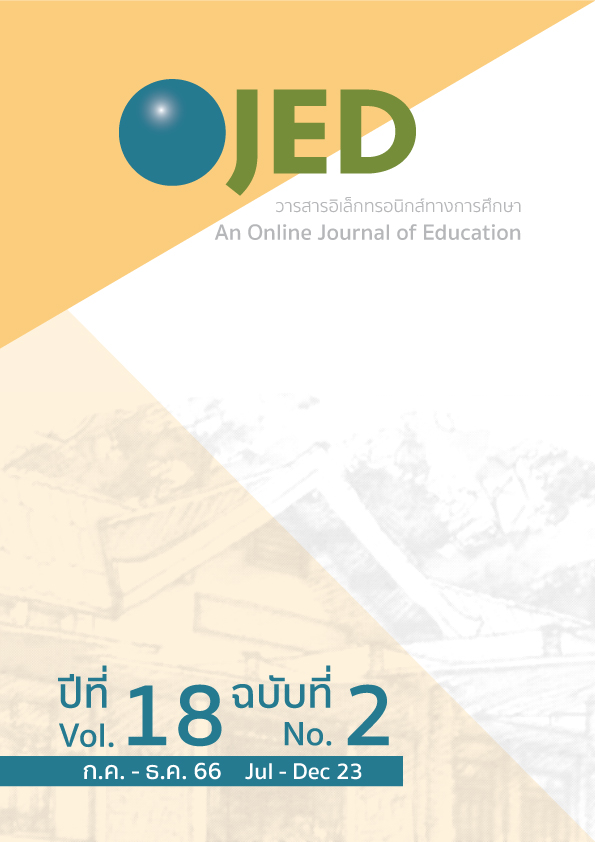Relationship between Work-Life Balance and Resilience of Early Childhood Teachers
DOI:
https://doi.org/10.14456/ojed.2023.18Keywords:
Work-life balance, Resilience, Early childhood teachersAbstract
The purposes of this research were study the relationship between work-life balance and resilience of early childhood teachers. The sample used in the research was 111 early childhood teachers in teacher vocational experience unit school, faculty of Education Yala Rajabhat University, academic year 2022. The research tools were questionnaires. The data was analyzed by frequency distribution, percentage, mean, standard deviation, and the Spearman’s rank correlation coefficient. The results found; early childhood teachers perceived overall work-life balance at a high level (M = 4.28, S.D. = .574) and perceived overall resilience as normal (M = 3.07, S.D. = .295), and Work-life balance had a statistically significant positive correlation with resilience at the .01 level, having a moderate correlation (r = .325).
References
ภาษาไทย
กรมสุขภาพจิต. (2563). เปลี่ยนร้ายกลายเป็นดี RQ พลังสุขภาพจิต (พิมพ์ครั้งที่ 4). สำนักวิชาการสุขภาพจิต
กรมสุขภาพจิต กระทรวงสาธารณสุข.
กระทรวงศึกษาธิการ. (2560). คู่มือหลักสูตรการศึกษาปฐมวัย พุทธศักราช 2560. โรงพิมพ์ชุมชนสหกรณ์การเกษตรแห่งประเทศไทย จำกัด.
นิรนาม. (2564, 12 กรกฎาคม). คมชัดลึกออนไลน์: ส่อง “ภาระงานครู” เมื่อครูไม่ได้มีหน้าที่แค่การสอนหนังสือเด็กอย่างเดียว. คมชัดลึก. https://www.komchadluek.net/kom-lifestyle/474002.
จุฑาภรณ์ หนูบุตร. (2554). ความสมดุลระหว่างชีวิตและการทำงาน กรณีศึกษา: โรงพยาบาลวิภาวดี.
[วิทยานิพนธ์ปริญญามหาบัณฑิต, ไม่ได้ตีพิมพ์]. มหาวิทยาลัยธรรมศาสตร์.
นรรัชต์ ฝันเชียร. (2564, 4 พฤศจิกายน). โครงการทรูปลูกปัญญา: เมื่อความเครียดของครูมีผลต่อพฤติกรรมของนักเรียน. ทรูปลูกปัญญา. https://www.trueplookpanya.com/education/content/85895/-teaartedu-teaart-.
ประภาศรี ปัญญาวชิรชัย และภวนัย กาญจนจิรางกูร. (2565). การศึกษาความเข้มแข็งทางใจ (Resilience Quotient) ของประชาชนไทยในสถานการณ์การแพร่ระบายของโรคติดเชื้อไวรัสโคโรนา 2019. วารสารวิจัยและพัฒนาระบบสุขภาพ, 15(1), 318-333.
ภาวรรณ ธนาเลิศสมบูรณ์. (2562, 2 ตุลาคม). The101.World: Work-Life Balance: ทางออกของชีวิต งาน และการมีบุตร. The101.world. https://www.the101.world/work-life-balance-seminar/.
เมธัช บัวชุม. (2557). ความสมดุลระหว่างชีวิตกับงานของครู/บุคลากรทางการศึกษาวิทยาลัยเทคโนโลยีปัญญาภิวัฒน์. วิทยาลัยเทคโนโลยีปัญญาภิวัฒน์.
ลัดดา แสนสีหา เลอลักษณ์ แทนเกษม และ ถิรนันท์ พัวพันธ์พงศ์. (2561). ปัจจัยความฉลาดทางอารมณ์ที่มีผลต่อความแข็งแกร่งในชีวิตนิสิตพยาบาล คณะพยาบาลศาสตร์ มหาวิทยาลัยมหาสารคาม. วารสารการพยาบาลและการดูแลสุขภาพ, 36(4), 186-194.
วรรณี แกมเกตุ. (2555). วิธีวิทยาการวิจัยทางพฤติกรรมศาสตร์. โรงพิมพ์แห่งจุฬาลงกรณ์มหาวิทยาลัย.
ศยามล เอกะกุลานันต์. (2562). ปัจจัยที่มีอิทธิพลต่อความสมดุลระหว่างงานและชีวิตของ เจ้าหน้าที่ดูแลลูกค้าทางโทรศัพท์หญิง กลุ่มธุรกิจ เทคโนโลยีสารสนเทศและการสื่อสาร. วารสารสุทธิปริทัศน์, 33(106), 107–120.
สุคนธ์จิต อุปนันชัย. (2556). อิทธิพลของการสนับสนุนทางสังคม การเห็นคุณค่าในตนเอง และการรับรู้ความสามารถของตนที่มีต่อความยืดหยุ่นทางอารมณ์ของนักเรียนในจังหวัดนนทบุรี. [วิทยานิพนธ์ปริญญามหาบัณฑิต, ไม่ได้ตีพิมพ์]. มหาวิทยาศรีนครินทรวิโรฒ.
สุภา เข็มแข็งปรีชานนท์, ระวี สัจจโสภณ และ ศุภรักษ์ อธิคมสุวรรณ. (2563). ปัจจัยที่มีผลต่อความสมดุลระหว่างชีวิตกับการทำงานของบุคลากรสำนักงานปลัดกระทรวงมหาดไทย. วารสารสังคมศาสตร์วิจัย, 11(1), 169-190.
สุวชิรา ศิริเจริญ. (2550). ปัจจัยความสมดุลระหว่างชีวิตกับการทำงานที่ช่วยส่งเสริมสร้างคุณภาพชีวิต บุคลากรภาครัฐ กรณีศึกษา : กรมป้องกันและบรรเทาสาธารณภัย. [สารนิพนธ์ปริญญามหาบัณฑิต, ไม่ได้ตีพิมพ์]. สถาบันบัณฑิตพัฒนบริหารศาสตร์.
อจิรประภา เหล็กโอก และ ในตะวัน กำหอม. (2564). ความคาดหวังของผู้ปกครองนักเรียนที่มีต่อการจัดการศึกษาปฐมวัย โรงเรียนบ้านขุนประเทศ สังกัดเขตหนองแขม กรุงเทพมหานคร. Journal of Roi Kaensarn Academi, 7(1), 149-162.
อภิพร เป็งปิง. (2562). ความเข็มแข็งทางจิตใจของเด็กในห้องเรียนอนุบาล. วารสารครุศาสตร์ จุฬาลงกรณ์มหาวิทยาลัย, 47(2), 369-384.
อัจฉราพรรณ วงษ์น้อย, พัชรินทร์ นินทจันทร์ และโสภิณ แสงอ่อน. (2564). ความสัมพันธ์ระหว่างความแข็งแกร่งในชีวิต ปัญหาการฝึกปฏิบัติงานบนหอผู้ป่วย และแรงสนับสนุนทางสังคม กับความเครียดของนักศึกษาพยาบาล. วารสารการพยาบาลจิตเวชและสุขภาพจิต, 35(2), 74-94.
ภาษาอังกฤษ
Ali, A., Akhter, N., Ramzan, M., & Tabassum. A. (2016). Psychological effects of excessive administrative visits on teachers' performance. Bulletin of Education and Research, 38(2), 1–13.
Barik, P. (2017). Work-Life balance of married female teachers in government and private schools of raipur, Chhattisgarh. IOSR Journal of Humanities and Social Science, 22(11), 38-46.
Bernard, B. (1993). Fostering resiliency in kids. Educational Leadership, 51(3), 44-48.
Bernard, B. (1995). Fostering resilience in children. https://files.eric.ed.gov/fulltext/ED386327.pdf.
Berryhill, J., Linney, J.A., & Fromewick, J. (2009). The effects of education accountability on teachers: Are policies too-stress provoking for their own good?. International Journal of Education Policy and Leadership, 4(5), 1–14.
Brough, P., Timms, C., O’Driscoll, M. P., Kalliath, T., Siu, O., Sit, C., and Lo, D. (2014). Work–life balance: A longitudinal evaluation of a new measure across Australia and New Zealand workers. The International Journal of Human Resource Management, 25(19), 2724-2744.
Carmichael, L. (Ed.), Manual of child psychology. Wiley.
Christy, F., David, A., Choudhary, N., Kalgi, N., & Maheswari, V. V. (2021). Impact of psychological capacities on the work-life balance of entrepreneurs. Psychology and Education, 58(3), 3,869–3,875.
Eley, D. S., Cloninger, C. R., Walters, L., Laurence, C., Synnott, R., & Wilkinson, D. (2013). The relationship between resilience and personality traits in doctor: Implications for enhancing well-being. National Library of Medicine, 1, http://doi.org/10.7717/peerj.216.
Erikson, E. H. (1963). Childhood and society (2nd Ed.). Norton.
Fursman, L. (2009). Parent’s long work hours and the impact on family life. Social Policy Journal of New Zealand, 35, 55-67.
Girisken, A. (2021). Understanding work-life balance, resilience and emotional endurance of single working mothers in the workplace: A Qualitative Study. Journal of Management Marketing and Logistics, 8(1), 64-75.
Goleman, D. (1998). Working with emotional intelligence. Bamtam.
Greenhaus, J. H, Collins, K. M & Shaw, J. D. (2003). The relation between work-family balance and quality of life. Journal of Vocational Behavior, 63, 510–531.
Kim, M., & Windsor, C. (2015). Resilience and work-life balance in first-line nurse manager. Asian Nursing Research, 9(1), 21–27. https://doi.org/10.1016/j.anr.2014.09.003.
Kose, S., Baykal, B., & Bayat, I. K. (2021). Mediator role of resilience in the relationship between social support and work life balance. Australian Journal of Psychology, 73(3). 316-325.
Liu, H., Luo, L., & Tang, W. (2021). Kindergarten teachers’ experiences of stress under a high-stake inspection regime: An exploration in the Chinese context. International Journal of Educational Research, 109, 1–10. https://doi.org/10.1016/j.ijer.2021.101850.
Mansfield, C. F., Beltman, S., Broadley, T., & Weatherby-Fell, N. (2016). Building resilience in teacher education: An evidenced informed framework. Teaching and Teacher Education, 54, 77–87.
Maslow, A. H. (1943). A theory of human motivation. Psychological Review, 50(4), 370–396.
Mattessich, S., Shea, K., & Whitaker-Worth, D. (2017). Parenting and female dermatologists’ perceptions of work-life balance. International Journal of Women’s Dermatology, 3, 127-130.
Mazerolle, S. M. (2018). An examination of relationships among resiliency, hardiness, affectivity, and work-life balance in collegiate athletic trainers. Journal of Athletic Training, 53(8), 788-795.
Min, D. (2022). Effects of resilience, burnout, and work-related physical pain on work-life balance of registered nurses in South Korean nursing homes: A cross-sectional study. National Library of Medicine, 101(30). http://doi.org/10.1097/MD.0000000000029889.
Omar, M. K., Mohd, I. H. & Ariffin, M. S. (2015). Workload, Role Conflict and Work-life Balance among Employees of an Enforcement Agency in Malaysia. International Journal of Business, Economics and Law, 8(2), 52-57.
Quick, J. C., & Tetrick, L. E. (2011). Handbook of occupational health psychology (2nd ed). American Psychological Association.
Schaubman, A., Stetson, E., & Plog, A. (2011). Reducing teacher stress by implementing collaborative problem solving in a school setting. School Social Work Journal, 35(2), 72–93.
Wong, K., Lai, A. T. S., Meng, X., Lee, F. C. H., & Chan, A. H. S. (2022). Work-life balance of
secondary schools teachers in Hong Kong, 219. http://doi.org/10.1007/978-3-030-74602-5_112.
Wong, M. N. & Li, H. (2010). From external inspection to self-evaluation: A study of quality assurance in Hong Kong kindergartens. Early Education and development, 21(2), 205–233.
Downloads
Published
How to Cite
Issue
Section
License
Copyright (c) 2023 An Online Journal of Education

This work is licensed under a Creative Commons Attribution-NonCommercial-NoDerivatives 4.0 International License.




